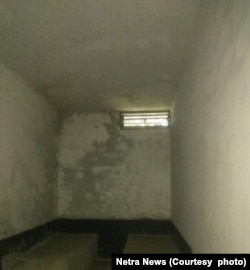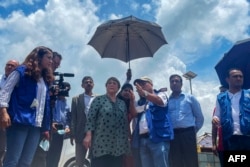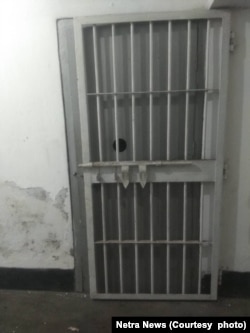This article has been revised and updated to add additional information and recast some portions.
In a startling text and video investigative report, a Sweden based news portal focusing on Bangladesh has revealed the possible location of a secret prison in which the victims of enforced disappearances are kept in Bangladesh.
The detailed report by Netra News is based upon the on-the-record accounts of two victims of temporary enforced disappearances who say they were kept inside the prison in the heart of the capital, Dhaka. Both men reaffirmed the details of the Netra News article in telephone interviews with VOA.
According to the two men, the prison is named Aynaghar (House of Mirrors) and is run by the Directorate General of Forces Intelligence (DGFI) — the intelligence branch of Bangladesh’s defense forces.
Netra News also published photos of the prison cells, which they said were provided to them by military officers who are still active in service.
The news site is edited by a reporter who fled Bangladesh after having personally being harassed and beaten by the police. It is funded in part by the National Endowment for Democracy, which is a nonprofit organization funded by the U.S. Congress.
Allegations of enforced disappearances and extrajudicial killings conducted by the state-owned forces have become commonplace during the administration of Prime Minister Sheikh Hasina Wazed, which has been in power since 2009.
The Netra News report appeared on the eve of a four-day visit to Bangladesh by United Nations human rights chief Michelle Bachelet, who spoke in Dhaka with several ministers about widespread allegations of enforced disappearances by state agencies.
In a departure press conference on Aug. 17, she said there are “continued, alarming allegations of both short-term and long-term enforced disappearances, and concerns about the lack of due process and judicial safeguards.”
Bachelet urged the Bangladesh government to establish “an impartial, independent and transparent investigation” into allegations of extrajudicial killing and torture as well as enforced disappearances.
Odhikar, a human rights organization based in Bangladesh, has counted at least 605 people whom it says became victims of enforced disappearances between 2009 and September 2021. Among those who disappeared, 81 were found dead and 154 people remain missing, the organization said.
Human Rights Watch, in an August 2021 report, wrote that “despite credible and consistent evidence that Bangladesh security forces routinely commit enforced disappearances, the ruling Awami League has ignored calls by donor governments, the UN, human rights organizations, and civil society to address the culture of impunity.”
Bangladesh Foreign Minister A.K. Abdul Momen told reporters after speaking with Bachelet that there is no such thing as “enforced disappearances” in Bangladesh, while Home Minister Asaduzzaman Khan suggested some of the missing persons had fled to other countries after committing crimes, or they had chosen to disappear after becoming bankrupt or because of family conflicts.
Regarding the Netra News investigation, Khan told reporters on Sunday that Netra News always comes up with “fake and bogus news.” “We don’t consider these as news at all,” he said.
DGFI was contacted for comments, but they didn’t reply.
Despite the mounting evidence of enforced disappearances, those victims who were later released have never before spoken publicly about their detention before for fear of retaliation. This is the first time these victims have spoken on the record and provided details of their experiences.
Similar statement
The detainees Shekh Mohammad Salim and Hasinur Rahman were interviewed separately by the Netra News, but their descriptions of the secret prison were identical in several details, leading the news portal to conclude that they were kept in the same place.
They described their respective cells as windowless, having a high ceiling with a single light, and loud and large exhaust fans running nearly constantly, drowning out all other sounds. They also provided similar descriptions of toilet facilities, food, and wall carvings where previous detainees had identified “DGFI” as their captors.
While Salim, a small-time welder now residing in Malaysia, was not 100% sure about the identity of the security forces, Rahman, a former lieutenant colonel of the Bangladesh army and a recipient of Bir Pratik — the fourth highest gallantry award of Bangladesh — had no doubts.
Rahman was once posted as a commander of the Rapid Action Battalion (RAB) — a notorious paramilitary unit on which the United States imposed a human rights-related sanction in December of last year.
Over a 28-year career in the service, he personally led a number of operations against suspected militants. But he was fired in 2012 based on allegations, which he strongly denied, that he was personally involved in militancy.
Even before Rahman was discharged from the military, he was abducted in 2011, allegedly by the security agencies, and his whereabouts remained unknown until his release after a few months. In 2018, he was abducted again and was kept inside Aynaghar for 18 months.
Rahman told Netra News was able to identify the location of Aynaghar by peeking to the outside through the toilet exhaust fans. As a former army man, he knew the ins and outs of the Dhaka cantonment and provided the outlet with enough details through which the news portal was able to geolocate the facility by using Maxar satellite images.
Great risk taken
Talking with VOA from Malaysia, Salim said he has gone on the record because he believes he is a victim of gross injustice.
The Netra News investigation determined that the security agency had been on the hunt for a person who was thought to be trying to assassinate Prime Minister Sheikh Hasina and was using the alias “Selim.” Salim may have simply been mistaken for that person.
“While I was there in that prison, I heard a lot of people crying in different cells. I am lucky that I got released, but many unfortunate people are still there,” Salim said. “I am taking this great risk just for the sake of them. I am urging [the government] to stop this heinous crime of enforced disappearances.”
Zulkarnain Saer, who was part of this Netra News investigation, told VOA that victims of enforced disappearances keep silent when they are released because the state has total control of their lives and those of their families.
“One misstep and they could be abducted and disappeared again, so it is hugely significant that these voices are heard and reported,” said Saer who worked as an undercover reporter on Al Jazeera’s award-winning investigative film “All the Prime Minister’s Men.”
Talking with VOA, Netra News editor Tasneem Khalil said it is the responsibility of the Bangladeshi authorities to provide security to these two survivors. “They are now known to the world for their courageous testimonies. Any attempted harm against them or their families will also be promptly brought to the attention of international communities.”









